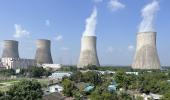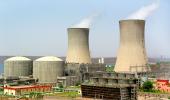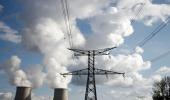With this, the unit has exited the construction phase and began the operational phase.

The first 700 MW Pressurised Heavy Water Reactor (PWHR) -- Unit 7 -- at the Rajasthan Atomic Power Project (RAPP) and India's third such unit began controlled fission chain reaction or went critical on the night of September 19, 2024, said the Nuclear Power Corporation of India Ltd (NPCIL).
The successful achievement of criticality of RAPP-7, after the smooth operation of the first two 700 MW PHWRs -- KAPS 3 and 4 -- at Kakrapar in Gujarat, demonstrates the maturity achieved by the company in the design, construction and operation of the indigenous 700 MW PHWRs, NPCIL added.
With this, the unit has exited the construction phase and began the operational phase.
Various experiments/tests will now be conducted before connecting it to the grid. Thereafter, the power level will be raised in steps to full power, in line with the clearances of the Atomic Energy Regulatory Board (AERB).
Early this month, AERB had given its nod to NPCIL for RAPP-7's initiation of controlled nuclear fission reaction or First Approach to Criticality.
On August 1, 2024, nuclear fuel began to be loaded into RAPP-7's reactor.
NPCIL had said commercial production of power by Unit 7 will happen this year and the other 700 MW plant (Unit 8) is expected to come on line next year.

In Rajasthan, the atomic power units are located in Rawatbhata district where already six units with a total capacity of 1,180 MW are in operation.
In July, the 220 MW -- Unit 3 -- at the Rajasthan Atomic Power Station was connected to the grid after undergoing major renovation and modernisation.
Unit 3 or RAPS 3 has now enhanced safety measures and 30 years of extended life, NPCIL said.
Commercial power generation began at RAPS 3 in June 2000 and was in operation for 22 years when it was taken up for renovation and modernisation in 2022.
NPCIL presently operates 24 reactors with a total capacity of 8,180 MW and has eight units (including RAPP-7) with a capacity of 6,800 MW under construction.
In addition, 10 more reactors with a total capacity of 7,000 MW are in pre-project activities. These are expected to be completed progressively by 2031-2032, NPCIL added.
Venkatachari Jagannathan can be reached at venkatacharijagannathan@gmail.com
Feature Presentation: Rajesh Alva/Rediff.com











 © 2025
© 2025